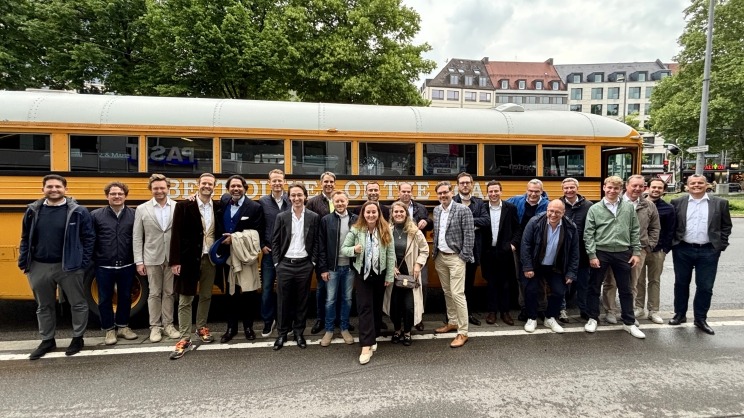Welcome Back Spotlight: Sandra Aragonez

Critical Skills to Acquire for Professional Development
Sandra Aragonez is a Senior Director in Performance Improvement in Mexico City, Mexico. She earned her bachelor’s degree from Instituto Tecnologico de Chihuaua and her master’s degree from the Universidad CEU San Pablo.
In this Q&A, Sandra discusses her journey at A&M, the critical skills she developed in collaboration and supply chain management, and the factors that influenced her return to the firm, emphasizing the importance of aligned values and mentorship in her professional growth.
Reflecting on your time at A&M, can you highlight the skills you developed or gained and how they contribute to your current role?
I wish to highlight that, despite the brevity of my initial tenure at A&M, this experience was instrumental in honing several vital skills relevant to the consulting industry. I particularly developed my capacity for effective collaboration within multifunctional teams, which included professionals from diverse cultural and geographical backgrounds. This exposure enhanced my understanding of cross-border teamwork and the intricacies involved in managing projects for a varied client base.
Moreover, my involvement in decision-making and complex problem-solving during this period allowed me to navigate challenging client engagements that demanded innovative solutions and strategic thinking. These experiences were pivotal as I tackled multifaceted issues, ultimately enhancing my consulting acumen.
Additionally, I want to emphasize that this initial period allowed me to strengthen my technical expertise in Supply Chain management. By executing projects that focused on logistics and manufacturing optimization, I gained critical insights into operational efficiencies and best practices, equipping me to deliver substantial value to clients and contribute meaningfully to their success in a competitive marketplace.
The Importance of Organizational Core Values and Relationship-Building
What specific factors played a crucial role in influencing your decision to return to the firm?
I have had the distinct privilege of collaborating with leading organizations and exceptional teams throughout my career. However, several key factors significantly influenced my decision to return to this esteemed firm:
- Alignment with Core Values and Strategic Objectives: The congruence between the firm’s core values and strategic objectives and my own professional aspirations has been paramount. The firm’s steadfast commitment to excellence, innovation and collaboration not only resonates with my personal philosophy but also creates an environment where I can thrive and contribute meaningfully.
- Valuable Experiences and Professional Relationships: The invaluable experiences and professional relationships I developed during my previous tenure at the firm were significant motivators for my return. The opportunity to collaborate with distinguished colleagues—who not only possess exceptional expertise but also serve as mentors and allies—was a compelling reason for rejoining the team. For me, it is essential to work alongside exemplary leadership and talent and I am eager to reconnect with extraordinary leaders and colleagues in this environment.
- Generating Value for Our Clients: The prospect of engaging in innovative projects and initiatives within the firm, particularly in areas where I can leverage my expertise in supply chain management to drive impactful outcomes, played a pivotal role in my decision. I am enthusiastic about contributing to initiatives that challenge conventional practices and enhance the firm’s value proposition in an increasingly competitive landscape.
In summary, the alignment of vision, the strength of professional relationships and the opportunity for meaningful contributions have profoundly shaped my decision to return to the firm. I am excited about the potential to create value and support the firm's strategic objectives as we navigate the complexities of the supply chain landscape together.
Based on your experience, what advice or insights would you offer to professionals considering a return to A&M or rejoining a former employer?
Based on my experience, I recommend considering the following guidelines during the evaluation process when contemplating a return to a previous employer:
- Conduct Comprehensive Self-Reflection: It is essential to engage in a thorough self-assessment regarding your motivations for returning to a former employer. Gaining a clear understanding of the underlying reasons for your desire to rejoin will enable you to articulate your intentions effectively. This clarity will help align your personal goals with the company's current objectives and values, ensuring a mutually beneficial reintegration.
- Re-establish Communication with Key Stakeholders: Maintaining open lines of communication with former colleagues and leadership is critical. Reconnecting with individuals who can offer insights into the organization’s evolution since your departure provides valuable perspectives and assists in gauging the current corporate culture, dynamics and opportunities available within the organization.
- Embrace Adaptability: In today’s fast-paced business environment, organizations frequently undergo changes in structure, strategy and personnel. Demonstrating a willingness to be flexible and adapt to new circumstances will facilitate a smooth reintegration and position you as a valuable asset to the team.
- Leverage Newly Acquired Skills and Experiences: Utilize the skills and experiences gained during your time away to your advantage. Bringing fresh perspectives and competencies can significantly enhance your contributions, underscoring your growth and development since your previous tenure.
The Power of Mentorship for Leadership Development
Who are your closest mentors and what important lessons have you learned from them?
I have had the distinct privilege of closely collaborating with exceptional leaders who have inspired, motivated and challenged me to continuously improve and to provide my utmost effort, both in my professional endeavors and in my personal life. We are ultimately the sum and reflection of the individuals with whom we interact most frequently, and I consider myself fortunate to be surrounded by remarkable mentors and individuals whom I admire for various reasons.
Upon reflecting on my mentors, I have identified a common characteristic among them: they are individuals who genuinely care and dedicate themselves to becoming exemplary leaders, not only from a technical perspective but also in the realm of human leadership. They inspire their teams through their actions and take an active role in their development. They consistently seek to update their knowledge, embrace innovation and maintain balance in all aspects of their lives.
Among these esteemed mentors are several Managing Directors at A&M Mexico, with whom I have had the opportunity to collaborate, in addition to board members and associates from ConaLog, the association I preside over, as well as former leaders and colleagues and close friends whom I deeply respect and admire.
Within A&M, one of my most significant mentors is and will be Luis Gomezchico. I have had the honor of working alongside him for many years, during which I have gained invaluable insights from him, beginning with my initial projects as a consultant. He has imparted knowledge ranging from technical aspects of project management to the development of commercial competencies and the effective management of client accounts and relationships.
As President of the ConaLog Board, you play a pivotal role in supply chain leadership. How has this experience influenced your perspective on organizational efficiency and strategic decision-making, and how do you see these insights translating into consulting engagements or advising roles?
My active involvement in a prestigious association focused on supply chain and logistics in Mexico equips me with a comprehensive understanding of the complexities and opportunities that various industries and businesses face, tailored by their size, maturity level and unique characteristics.
This position enables me to identify critical areas for improvement that can drive the competitiveness of organizations operating in Mexico. I have the opportunity to observe and analyze innovative practices and strategies being implemented across different companies, which are pivotal for transforming and advancing supply chain operations.
As President, one of my primary responsibilities is to empower our members and the broader logistics and supply chain community with essential resources, insights and key networking opportunities. This support facilitates the implementation of transformative initiatives that enhance operational efficiency from strategic planning through to execution.
This strategic alignment with my consulting career allows me to leverage industry insights to devise, propose and implement high-impact solutions for our clients. By doing so, I ensure that the projects I influence or participate in not only achieve success but also deliver measurable value and optimized outcomes in alignment with our clients' strategic objectives.
Understanding Why Continuous Learning Matters
How does your experience teaching at Universidad Iberoamericana in Mexico influence your approach to understanding and teaching supply chain concepts, especially in a diverse cultural and educational environment?
My experience teaching has profoundly influenced my approach to understanding and teaching supply chain concepts, particularly within a diverse cultural and educational context.
Firstly, teaching in such a culturally rich environment has enhanced my ability to appreciate varying perspectives and learning styles. Recognizing that students come from diverse backgrounds allows me to tailor my teaching methods to better engage and resonate with all participants. This inclusivity not only fosters a more collaborative classroom atmosphere but also encourages students to share their unique insights, enriching the learning experience for everyone involved.
Furthermore, my interactions with students and faculty have deepened my understanding of the complex challenges faced by supply chains in emerging markets. I emphasize practical applications of supply chain theories, integrating case studies that reflect local market conditions and cultural nuances. This approach enables students to grasp the relevance of supply chain principles in their specific contexts, bridging the gap between theory and practice.
In addition, I prioritize fostering critical thinking and problem-solving skills among my students. By presenting real-world scenarios and encouraging collaborative discussions, I challenge students to analyze, propose and evaluate solutions to supply chain issues. This method not only develops their analytical capabilities but also prepares them for the dynamic and often unpredictable nature of supply chain management.
Lastly, my teaching experience has reinforced the importance of continuous learning and adaptation in both academia and the supply chain industry. I strive to instill in my students an entrepreneurial mindset, encouraging them to be innovative and agile thinkers who can navigate the complexities of modern supply chains.
In summary, my experience at Universidad Iberoamericana has equipped me with the tools to deliver a comprehensive, culturally sensitive and practical education in supply chain management. This multifaceted approach not only prepares students for successful careers but also contributes positively to the broader discourse on supply chain practices in diverse contexts.
As a chess player, how has your ability to strategize in the game influenced your approach to solving complex supply chain challenges in your teaching role and in consulting?
As a chess player, I have come to appreciate the profound parallels between the game and the complexities of supply chain challenges. Chess has taught me the importance of strategic thinking, foresight and adaptability—skills that are invaluable not only in the realm of chess but also in my teaching and consulting roles.
In chess, every move requires careful consideration of the current position, potential future moves and the overarching strategy. This disciplined approach translates seamlessly into supply chain management, where understanding the intricate relationships between various components is essential. I view each supply chain challenge as a unique position on the chessboard, requiring a well-thought-out strategy that takes into account both immediate and long-term implications.
Moreover, chess trains us to anticipate our opponent’s moves and adapt to changing circumstances—an essential skill in today’s rapidly evolving business landscape. In teaching, I strive to inspire my students to think critically about the factors influencing supply chains and to encourage them to explore multiple perspectives. Just as in chess, where a single move can change the course of the game, in supply chain management, one innovative solution can dramatically improve efficiency and effectiveness.
Furthermore, the game has instilled in me the value of patience and resilience. In both chess and consulting, not every strategy will yield immediate success, and setbacks are part of the journey. It is vital to learn from each experience, reassess the situation and adjust our strategies accordingly. I instill this mindset in my students, empowering them to embrace challenges as opportunities for growth.
Ultimately, my experiences on the chessboard embody the spirit of continuous learning and strategic adaptation. By blending these principles into my approach to supply chain challenges, I not only enhance my own effectiveness but also inspire my students and clients to harness their creativity and strategic thinking. Together, we can navigate complexities and drive meaningful transformations in the supply chain landscape, ultimately creating value for our organizations and communities.
In embracing this chess-like mentality, we encourage ourselves and others to approach challenges with confidence, creativity and an unwavering commitment to achieving success, whether on the chessboard or in the business arena.
Creating Work-Life Balance
How do hiking, Bikram yoga and volleyball contribute to your life outside of work?
I firmly believe that to become a great professional, it is essential to work on and develop all aspects of our lives, including physical, social, personal, familial, relational and spiritual dimensions, among others.
A person who prioritizes self-care and nurtures the areas of life that matter most to them—such as health, family, friendships and hobbies—will undoubtedly bring more to their circle. This, in turn, enriches the teams they work with and the organizations they contribute to.
How often have we encountered complex situations at work, only to find that after a rejuvenating walk, an invigorating workout, or a delightful dinner with friends and family, fresh alternatives emerge that we hadn’t considered after hours of trying to solve the problem?
What I wish to convey is the importance of balance. I am convinced that innovation and the ability to generate and implement transformative value propositions require a holistic approach—growing as individuals beyond the professional realm. For me, nurturing all aspects of my life helps me relax, think clearly, reconnect with my core values, dream boldly and stay on course to achieve my ideals and objectives across every facet of my existence.
By embracing this balance, we not only enhance our own lives but also empower those around us to do the same. In doing so, we cultivate a more supportive and innovative environment, ultimately driving positive change in our workplaces and communities.
Embracing Cultural Diversity
How has your husband's Venezuelan background enriched your perspective on cultural diversity, both personally and professionally?
My husband's Venezuelan background has profoundly enriched my perspective on cultural diversity in several meaningful ways, both personally and professionally.
On a personal level, being part of a multicultural relationship has allowed me to embrace and appreciate the richness of Venezuelan culture, including its traditions, customs and values. Sharing family gatherings, celebrations and culinary experiences has fostered a deeper understanding of different ways of life, broadening my worldview. This exposure has not only enhanced my cultural sensitivity but has also encouraged me to celebrate diversity in all its forms within our household, nurturing an environment of inclusivity and respect.
Professionally, my husband's background has equipped me with unique insights into the dynamics of working in diverse teams and engaging with clients from various cultural contexts. I have learned the importance of effective communication and the necessity of being mindful and respectful of different cultural perspectives. This understanding has proven invaluable in collaborative settings, where flexibility and adaptability are key to fostering strong working relationships and achieving collective goals.
Furthermore, my experiences within the Venezuelan community have deepened my appreciation for the challenges and opportunities presented by cultural diversity in the workplace. I have gained a greater awareness of the significance of inclusivity in driving innovation and enhancing problem-solving capabilities. In my professional interactions, I strive to be an advocate for diversity and inclusion, actively promoting environments where diverse voices are heard, valued and leveraged for collective success.
In summary, my husband's Venezuelan background has profoundly shaped my understanding of cultural diversity, enriching both my personal life and professional endeavors by fostering a deeper appreciation for different cultural perspectives and promoting inclusive practices in various contexts.




